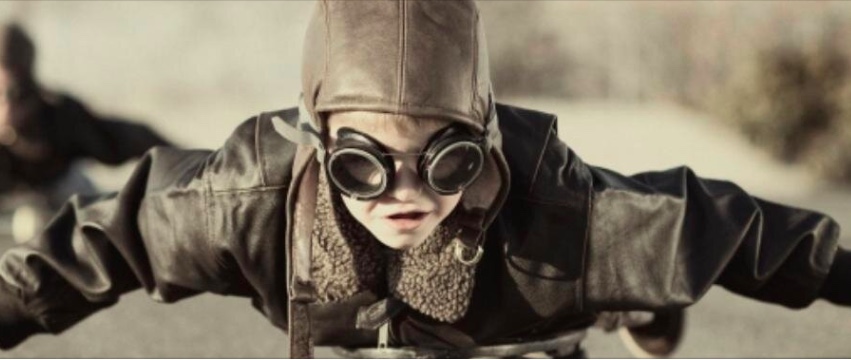This book is so good I don’t know where to start. Just read it. (There’s an introductory 20% discount on the e-book below.)
Except – seriously – don’t read it if you demand a roadmap from here to the future. This is from the future. The image above, of a kid with a telescope, has been in the author’s office since I first met him, but until I was halfway through this book I didn’t understand why.
In Augmented Health(care) Dutch innovator Lucien Engelen of Radboud University Medical Center goes on a tour of the landscape that may strike the unfamiliar as manic or just plain nuts. Don’t trust that reaction – listen. He is unbound by the traditional view but absolutely bound to a future world where health – and care – are augmented such that things actually work.
He ignores any requirement that the future must include today’s players, which is a fair position, lest we get stuck in that anti-transformational neurological condition non potes hinc illuc*. Instead he stands way out on the foamy leading edge of the farthest wave and looks through that telescope at what’s happening out there, what people are doing new, and looks at how all those things might fit together if they were allowed to – in particular what your life and mine might do about health (and sometimes care) if the system didn’t have other ideas.
 Don’t shrug this off as a detached utopian vision. If you study the future you should know about Deloitte’s Center for the Edge, and its Shift Index (“measuring the forces of long-term change”), which monitors five big shifts in how the world is changing. I first learned about the Shift Index when they wrote about me, and participatory medicine, back in 2011. (If you don’t know about it, watch their six minute YouTube What is the Big Shift?)
Don’t shrug this off as a detached utopian vision. If you study the future you should know about Deloitte’s Center for the Edge, and its Shift Index (“measuring the forces of long-term change”), which monitors five big shifts in how the world is changing. I first learned about the Shift Index when they wrote about me, and participatory medicine, back in 2011. (If you don’t know about it, watch their six minute YouTube What is the Big Shift?)
Well, the Center for the Edge has just taken Lucien on as an Edge Fellow, with the title Global Strategist, Digital Health. And if you’re not following him on LinkedIn, maybe you should, because right now he has 794,805 followers there.
2011 is the same year this “crazy Dutchman” held a TEDx conference about healthcare, with the crazy idea of having patients as speakers, including me. He’d also announced that he’d no longer speak at conferences that didn’t help patients attend (not “allow” but actively help), which at first was nuts but is now the global #PatientsIncluded movement.
In this book Lucien flies over (and crawls around in) a post-Darwinian world where chimerical creatures are encountered all the time, as befits a future world where the Big Shifts have altered the laws of nature. He talks about how they might be combined with each other, in perhaps abnormal sounding ways, because by the time you could figure out what should work together, the reality will have changed again. The book’s subtitle is “The end of the beginning,” because one thesis of the book is that where we’ve gotten to today is a beginning, and we’re about to evolve out of it, but not in orderly ways.
Still in?
I hope you can see that to “hear” the book’s message you’ll need to read it, but I’ll summarize the five parts (“Themes”).
- Part 1: What’s been going on? The internet emancipates patients (emancipation: a word I’ve just begun using myself), and there is much hype, which always leads to much disillusionment. But something real is happening. Last chapter: “The Way of the Dodo.”
- Part 2: Cracks in the Systems. Digital health and the power of data are cracking the walls. The walls don’t believe it. Last chapter: “It’s the Trust, Stupid!”
- Part 3: Taking Part is the Only Way. I can’t overstate how important this is: you cannot understand any of this by observing, because your whole way of comprehending what things are is based on today’s reality. You have to go out onto that leading edge and get your hands dirty trying to do things with these new tools.
- Part 4: Where to start? This “part” is just one chapter – a new exposition of nine shifts he and Deloitte see, in the “digital DNA framework.” (Getting the picture?)
- Part 5: This revolution will not stop.
The world is changing, and what’s possible is changing. If you plan the future by first nailing yourself to today, you will never get us there. That’s why I’ll close by plucking this from Kerouac:
“The only people for me are the mad ones … desirous of everything at the same time, the ones who never yawn or say a commonplace thing, but burn, burn, burn like fabulous yellow roman candles.”
You decide whether this is the kind of book you want to read about health and care. If you do, please get excited, and keep an open mind. Remember: the big shifts are altering what’s possible, and as the rules change, you want to be nimble enough to hop from possibility to possibility. If you can handle that, you’ll love this.
Oh, here’s his other classic photo – it’s the cover image on his Twitter profile:
You can read the prolog free on the book’s website.
Purchase the book (color or b/w or e-book) on Lucien’s site. The e-book offers instant delivery and color illustrations. Or buy it on Amazon: Kindle, b/w, and color edition (with much better illustrations).
* non potes hinc illuc: Latin for “you can’t get there from here.” It’s the punchline of an old joke (not really a neurological condition), but it’s a belief I keep hearing in health(care) discussions! Think I’m kidding? Read its origin – it’s practically verbatim from health(care). In that post, replace stranger and locals with visionary and experts:
A visionary asks an expert for directions. After starting to give directions several times (each one different) and stopping part way as they got confusing/turned out wrong, the expert finally decides, “You can’t get there from here.”
You may not think so, but that kid on the skateboard is headed there anyway.




Sounds fabulous. So much to read so little time. Love the Latin quotation. You really are a deep and revolutionary thinker.
“You can’t get there from here.” This punch line appears in the Bert and I series of Maine anecdotes by two Yale students, Marshall Dodge and Bob Bryan. I think that was ~ 1958.
Yes, that’s exactly the New England classic I was alluding to – I assumed everyone would get it but maybe not, so thanks :)